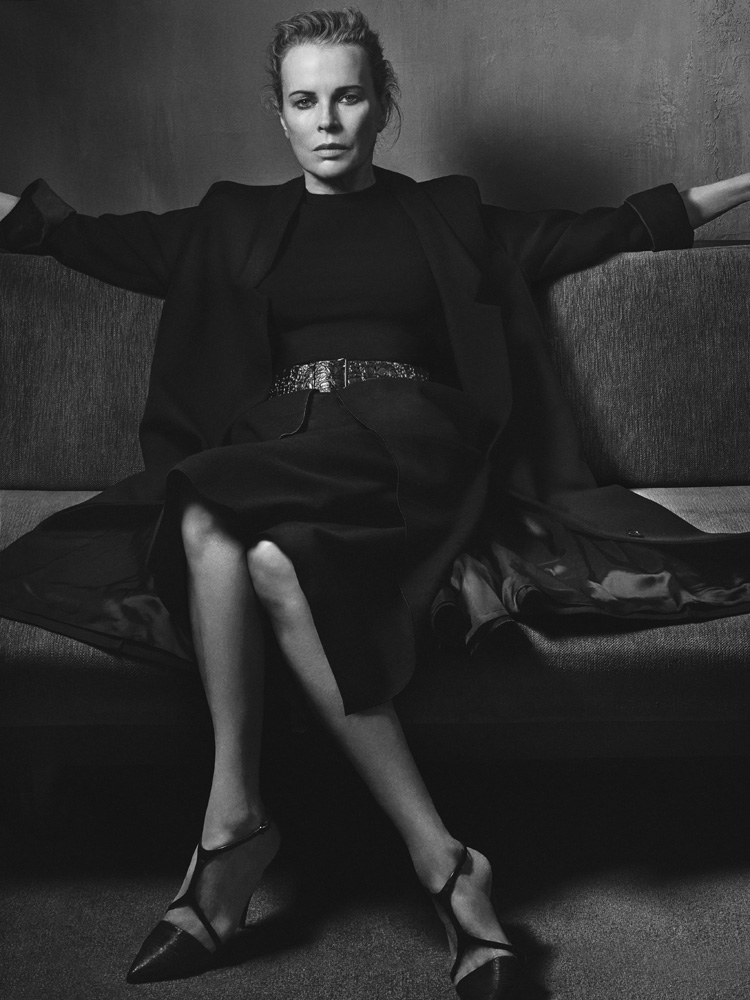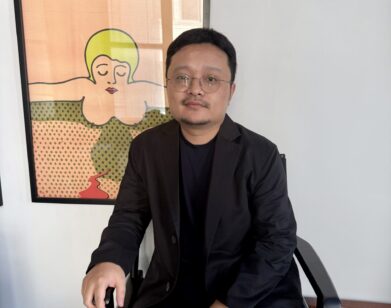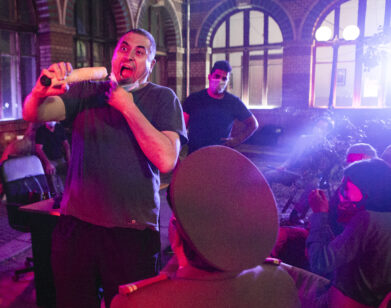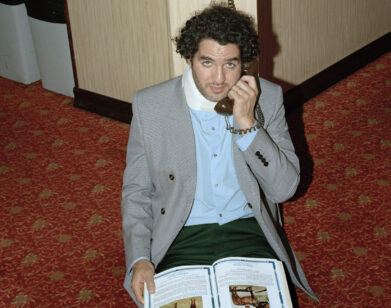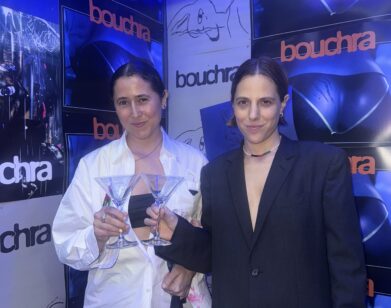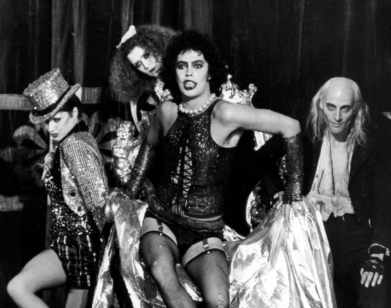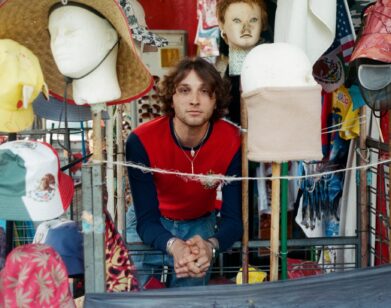Kim Basinger
WITH EVERY PROJECT I’VE EVER DONE, I’VE always TREATED IT like I’M STILL IN SCHOOL. EACH TIME YOU TRY TO GO a LITTLE FURTHER, GET A little DEEPER, FEEL A LITTLE MORE, SCULPT IT a LITTLE BETTER. Kim Basinger
“Oh, my god!” Kim Basinger squeals in the middle of our conversation. Her reaction explodes because she glances out the window of the restaurant in downtown Studio City where we’re sitting; she is completely caught off-guard by the spectacle of a pack of 12 O’Clock Boys—dirt-bike riders who show off by standing straight up—as they’re shooting through an intersection. This is possibly their way of adding to the occasion: Basinger has taken time from her schedule to sit with me on her sixtieth birthday. It’s one of many surprises that take place on a chilly, cloudy Los Angeles day. It’s tough to imagine any other Oscar winner—Basinger picked up the award for Best Actress in a Supporting Role for her turn as the glam hooker who trades on an outstanding resemblance to iconic ’40s pin-up Veronica Lake in Curtis Hanson’s adaptation of L.A. Confidential (1997)—giving up time on her birthday in order to discuss a career that includes her newest project Grudge Match, the meta-comedy reuniting Sylvester Stallone and Robert De Niro as a pair of presumably retired professional boxers climbing into the ring for an equally presumable final match, sequel possibilities not included.
Not that sequels have been an option for Basinger—as she mentions, she’s never appeared in one, nor has she ever been asked. Instead, she became a star in another way. She has spent much of her professional life sandwiched between icons, working with Sean Connery in his last stand as James Bond in Never Say Never Again (1983), co-starring with Natalie Wood in the ’70s miniseries version of James Jones’s From Here to Eternity, baring flesh and sensibility to the proto-Fifty Shades of Grey debauch of Adrian Lyne’s 9½ Weeks (1986) with Mickey Rourke—while on the way to becoming a bigger-than-life figure herself. Her upcoming movies include a teaming with fellow Oscar winner Paul Haggis for his springtime release Third Person, an ensemble drama in which she plays the thoughtful but emotionally aware ex-wife of Liam Neeson, a fellow sufferer with a somber self-destructive nature.
Since it is Basinger’s birthday, I show up with a balloon, which she shyly accepts as a gift—”You know, this isn’t really that big a deal,” she demurs, as she apologizes for not having succumbed to her impulse to bring me a cupcake from Sprinkles. I’m recovering from pneumonia, and her concern rises with every muffled hack on my part. But what’s evident from spending time with her is how easily she accesses her empathy; she feels every moment she speaks of, be it the potentially deadening aspect of complete access to everything that kids have or her father’s denial of his own artistic pursuits to support a family. And Basinger is fully aware of what that sacrifice meant for her dad. Noting what he gave her is how our talk begins.
ELVIS MITCHELL: Did you grow up as a big music person?
KIM BASINGER: Well, my dad was a musician, and that was his first love, and I think probably, to be really honest, it was my first love as well.
MITCHELL: Did you sing a lot as a girl? Did you perform in church choirs and that kind of stuff?
BASINGER: Definitely in the church choir. My dad sang in the choir every Sunday, and I did as well. I loved it. He played the trumpet and the piano all of his life.
MITCHELL: Did you play as well?
BASINGER: I play the piano some. I’ve written a lot of stuff for the guitar mainly. My dad studied at the American Conservatory in Chicago, so he lived on all those streets. He said the war probably saved his life because he’d have ended up a dead musician, with all the crazy stuff they did on Rush Street back in the day. But he loved music that much. With some people, that love of music is just buried in them. It’s so deep in them that they would play for free because they have to. There’s a great phrase: because I have to. My dad loved music from the core of his soul.I don’t see a lot of my own movies . . .
MITCHELL: Did he play around town when you were a kid? Did you go see him perform?
BASINGER: Oh, no, no. By that time, my daddy had five kids. He went to war, and then he came back and got married and got in frustrating finance. That’s kind of what my father did his whole life: finance. He didn’t really follow his dream. I mean, he would look at life today and say his life was truly successful because he’s proud of his kids. But I would have loved to have seen him really go on that journey. I think he became extremely frustrated … He gave his trumpet away, actually, to a kid on the street. I think that was a symbol of just cut the crap and get on the horse of life that came riding in. He did that instead of wandering around in the snow with the trumpet, which is what I think he should have done. And the older I’ve gotten, I really do feel that it’s a lack of trust that I see in people and that’s why they don’t follow their dreams—because they don’t trust anything. They don’t trust that there will be success, and you can’t think like that. You have to trust the journey. That has become my motto for years: trust the journey. Because in the end, we’re all kind of fearful. We all have fears and insecurities and ups and downs.
MITCHELL: My parents are from Hattiesburg, Mississippi, and I feel like it’s an old Southern thing where people say that as a kid, you can be an astronaut or a ballerina or a singer, but as a grown person, you need to go and get a job. Did you hear that at all as a kid?
BASINGER: No, not at all.
MITCHELL: So you were encouraged then?
BASINGER: No. I mean, my dad did, and my mom … My mom and I were very close when I was a girl. I think my mother had a lot of opportunity when she was a kid. She was a model, and she did a lot of things in her life, but she had no real ambition. I think my mother really did want a home and kids and all of that. My father strictly loved music. It’s a really funny subject, though, because something was in my soul since I was born. In life, there are no certainties, but there are certain things that are just there and you can’t deny them, and I knew that I would leave Athens [Georgia] when I got older. Ever since I was a tiny little girl, I loved music and I loved to make people laugh—or I loved watching my dad’s face when he and I would be in front of a television. I never really saw my dad as entertained as when he was just completely blown away by somebody on the television screen or at the movies. I think that’s the real reason that I went into acting. We were always kidding around, doing accents and all this kind of stuff. I saw everything there was that could possibly come to town. I fell so in love with My Fair Lady [1964] when I was a little kid. I knew all the dialogue.
MITCHELL: Did you sing the songs, too?
BASINGER: Oh, yes, of course. It’s the thing that actually got me out of Athens, because I entered the Junior Miss Pageant when I was a kid, and I won in my hometown. I didn’t really care that much about winning—I only cared about getting up in front of the people and singing the song and not fainting. So my dad made me a bet that I would get up there and really do it well. I found myself walking out onstage that night when I was a kid. I think I was 16 years old.
MITCHELL: What did you sing?
BASINGER: “Wouldn’t It Be Loverly?”
MITCHELL: From My Fair Lady.
BASINGER: I sang it in an English accent. And, you know, I was so shy at school that I hardly ever talked, so everybody thought I was kind of a hermit. [laughs] And that night, I walked out on the stage and sang in front of the whole high school. You could hear a pin drop because they said, “We didn’t know she could talk, much less …” So they were a little surprised I had this big voice. Honestly, they could have taken the rest of the night, with all the other divisions and stuff we had to do, because after I sang that song, it got out of me. You know, with all I’ve accomplished and all the things I’ve done in my life in a professional sense, I’ve never been as thrilled again in my entire life because it had to do with music, and because it was what I deeply love so much, and because my father was in the audience that night.
MITCHELL: What did he say to you afterwards?
BASINGER: My dad was on cloud 21. He was floating because he had told me, “I know that you’ll do this.” I had been sick all week with bronchitis prior to the competition. I had rehearsed for the longest time. My dad had even hired an accompanist to play for me on a piano. But he had never pushed me to music because I don’t think he wanted me to be hurt as much as he was if it didn’t work.
MITCHELL: But he was that way to protect you.
I DON’T SEE A LOT OF MY own MOVIES . . . I KNOW THAT SOUNDS WEIRD BECAUSE A LOT OF ACTORS LIKE to RUSH TO THE MONITOR. BUT I WOULD BE MORTIFIED TO LOOK at a MONITOR. Kim Basinger
BASINGER: I think that was a piece of it, yeah. I think it was to protect me. But as a little kid, you don’t understand that. You want someone to help you; you want someone to push you. My mother was truly gifted in so many ways. I mean, my god, she made everything we wore. She was so far ahead of her time, wearing orange and pink and red together back in the ’50s. She just didn’t care. And she was gorgeous. She was gorgeous with what she made, the clothing she designed, everything—the house, the things she would do. My mother had a great voice, too. She just never had any aspirations to be in the movie business.
MITCHELL: But she was finding her creativity in the household.
BASINGER: That was her creativity. And she loved it. She was a chef beyond life. She could do anything she put her mind to. She had so much talent, and it all kind of went into the kids in different ways.
MITCHELL: It sounds like all that creativity that your mother was putting into the house was touching you in some way, too. Was it?
BASINGER: Oh yeah. She taught me so many lessons about so many things that I use now and have taught my own daughter. But a lot of it went unspoken. When you are a family that has five kids—and usually there were two others living with us or staying with us—there is a lot to be done. We were not a privileged family. I mean, to me, we always had everything we needed, but we weren’t wealthy people. My dad worked very hard for the money he made, and my mom worked very hard to keep this household up and running and all the kids fed and everything. And she did it in a brilliant fashion. They both did. In fact, the work ethic, to me, is so important in this life—especially for this generation of kids coming up now. I mean, if you look at this generation of selfies and selfies and selfies, it seems a little bit scary. I like to see a driven kid, somebody who wants to come from the ground up. I love to see somebody who wants to be the best they can be. I appreciate that as a human being because you just don’t know what’s going to happen to this generation of kids.
MITCHELL: Do you feel like you don’t see that kind of direction and motivation in kids nowadays?
BASINGER: I don’t know. I see kids, and they acquire things much easier today. There’s too much abundance all over the place. Walk in the mall—I just want to say, “What is all this stuff?” More, more, more, more. [laughs] It’s never enough, and it causes a great deal of anxiety. Everybody is trying to keep up with everybody else. I mean, there’s always been anxiety, there’s always been competition, but I think this is an anxious generation. I just thank god that I didn’t grow up with so much money or privilege because you had to create ways to make it happen.
MITCHELL: So what kind of stuff did you guys do in Athens? I mean, in the days before R.E.M.
BASINGER: You know, I know all of those guys.
MITCHELL: Of course you do.
BASINGER: I went to the University of Georgia for a year before I left, and then I went to live with Eileen Ford in New York for the modeling agency. I thank god I could do that because all the other kids were getting jobs doing other things, and when I got to New York, I was very blessed. I didn’t have to stop and be a waitress. I started making money at a very young age and was just very lucky.
MITCHELL: You must have had some faith in yourself to move to New York as a model.
BASINGER: Well, confidence … I’m not too in love with the word ambition, but I was driven.
MITCHELL: Was it more belief than confidence, then? Was it this faith that you wanted to make this thing happen?
BASINGER: It was just an on-going belief and faith that this is where I was supposed to go, where I was headed, because I had to do this thing. It was really just an intuitive knowing, and you don’t back down from that. I don’t care if fear is involved—and there had been a tremendous amount of fear at times.
MITCHELL: The first time I saw you was in that TV remake of From Here to Eternity [1980]. You play the Donna Reed part.
BASINGER: Oh, I remember that like it was yesterday. That was one of those good old miniseries. I got to meet Natalie Wood.
MITCHELL: What was that like?
I WENT IN TO THE AUDITION FOR 9 1⁄2 WEEKS NOT KNOWING what I WAS GOING TO DO, AND I REMEMBER IT WAS JUST A weird, SEXUAL KIND OF SCENE, AND I WAS NOT HAPPY AT ALL WHEN I LEFT. I said, ‘I COULD NEVER…’ I CRIED IN the CAR ON the WAY HOME. Kim Basinger
BASINGER: Oh, my god. Until you really see a real movie star like that … She was an extraordinarily beautiful woman. She and I had a scene together, a short one, and it was near water.
MITCHELL: Which she was terrified of.
BASINGER: Which she was terrified of—and I’ll never forget that as long as I live. That was a real trial for me, that movie. But you learn something from everything you do. With every project I’ve ever done, I’ve always treated it like I’m still in school. Each time you try to go a little further, get a little deeper, feel a little more, sculpt it a little better. That piece between “action” and “cut” is very exciting for me. But your trials and tribulations, if they come when you’re young, you’re very lucky because then you learn. It’s like you learn on a dime how to look at someone and really be in that moment and really feel that emotion and let it out. People say, “Oh, I’ve got this huge crying scene to do today,” and there are people who can turn it on and off like a faucet. That comes from searching for where you go to get that, where that river flows. It’s great when you find it, but oh, boy … You never stop the measuring process because these are oceans that are so deep that they have no bottom, and it takes a long time to know that. It only goes to a higher place after you’ve gone to the depths where you think there’s a bottom—and when you find out that there is no bottom, it just rises up into this plume of euphoria. I mean, I just finished a project called Petit, which was directed by Anders Morgenthaler. It’s very difficult to describe, but it’s about a woman with a belief when no one else around her believes. It’s a fairy tale. But that movie was where I discovered that there was no bottom.
MITCHELL: What was that like?
BASINGER: Well, with other movies—for example, The Door in the Floor [2004]—you go to a certain place, and you think you’ve hit bottom, and that subject matter is what it is, and you let ‘er rip. That’s when trust in the journey comes in. You say, “Where in the world am I going to go to get this, where I turn myself inside out, as an actress here on this ground, or for an audience, or for the truth of the tale, to be true to my character, Maria. Where do I go to get this?” It’s such agony trying to figure out where it’s going to go. It’s full of agony and anxiety, and you don’t want to face it. But then you discover that it all flows at not only great depths, but also at great heights.
MITCHELL: What you’re saying makes me think of a film you did several years ago, Even Money [2006], in which you play somebody who is a bit lost in an emotional sea. She’s telling herself one thing and telling everybody else everything else.
BASINGER: Well, she’s just a blatant liar—and a mess. [laughs] But a person like that has never once—and I mean this as a metaphor—looked in the emotional mirror and seen a reflection at all. She is absolutely, totally bankrupt about herself. That’s what happens. So you go to some phony place to pretend and build whoever you are in that moment.
MITCHELL: I thought about that film because it was directed by Mark Rydell. When you were younger, you probably saw his movies, like Cinderella Liberty [1973] or The Rose [1979]. What was he like?
BASINGER: Oh, he’s a lovely man. It was a strange time for me. That was a strange movie, so I don’t really have a lot of memories of that movie. You know how some movies—even movies you’ve done way before—they’re just clearer in nature. I think Even Money had an energy to it that I did not care for, and some of it had to do with shooting it in the Ambassador Hotel where Robert Kennedy—
MITCHELL: Was assassinated.
BASINGER: Yes. I didn’t like it. I just wasn’t happy there. I am very funny about that. I’m very sensitive to energy and people and life and animals and a lot of things. I mean, either you are or you are not, and I’m very aware of things. I don’t know whatever happened to the original Ambassador Hotel. Didn’t they sell it?
MITCHELL: I think they’re bulldozing it and turning it into condos. What was a set where there was really good energy? I have to say, one of my favorites films you’ve done has always been Nadine [1987].
BASINGER: Thank you. As a young actress, I had great love for Robert Benton—as a director and as a person. I loved Néstor Almendros [the cinematographer], and I loved Jeff Bridges—I don’t think there’s a thing he cannot do. But Nadine was a great character. I think she was someone Robert Benton had grown up with in Texas. I don’t know if she was a girlfriend or some secret whatever, but she was a real person, and I was out of my mind doing that movie. It was just a great, funny movie, and I was happy. You know, I started in comedy …
MITCHELL: You got to work with one of the great comedy writers, Blake Edwards, at the beginning of your career. You actually worked with him twice.
BASINGER: Yeah. Robert Altman, too. I’ve been so blessed to work with such great filmmakers and artists.
MITCHELL: You worked with Benton when he was coming off of Kramer vs. Kramer [1979] and Places in the Heart [1984]. He’s a real Texan—he grew up in Waxahachie.
BASINGER: Oh, good god. And smart and talented, and his wife was wonderful. They became my good buds. I used to go out to Wainscott on Long Island and stay with them. But nothing is any greater than to see Benton out of the corner of your eye watching a scene in the monitor and chewing on something and just laughing and laughing. I had a similar thing with Blake Edwards.
MITCHELL: Do you remember your first meeting with Blake? You were working with him and Burt Reynolds on The Man Who Loved Women [1983], which was a remake of a Truffaut movie.
YOU’D THINK WITH ALL THE MAGAZINES AND the COVERS and THE SEXY STUFF, THAT THAT’S HUGELY A PART OF ME… BUT IT IS ALL SUCH PRETENSE. SO I just THOUGHT, ‘MY GOD, I CAN’T BE ONE of THOSE GIRLS. I WEAR BIB JEANS.’ Kim Basinger
BASINGER: It was Blake Edwards who sought me out because, at the time, I had a boyfriend who was a makeup artist, and I visited him on the set, and Blake wanted to know who I was. It was really that simple. And I thought, “How does he know I can even be funny?” But then I started doing one comedy after another before I was ever even allowed to do a drama in this town. So I came from comedy. Now I’ve done so many dramas in my life, and people don’t even know I came from comedy.
MITCHELL: You were in one of the last comedies that Bruce Willis did back when he used to do comedies, which people forget. While he was on Moonlighting, you did Blind Date [1987] together.
BASINGER: And Bruce is hilarious. He’s another one that surprises you. He’s a nice guy, too. He’s not just this tough guy you see in these really big movies. You know, it’s so hard to get up there and make people cry, but to me it’s a much more difficult a task to make people laugh. There is such specificity to it when it comes to that instinct and to knowing what’s funny. Although, I don’t see a lot of my own movies.
MITCHELL: Why?
BASINGER: I mean, with film all over the place the way it is today—they show them on HBO—you can’t help but see them as you cross the room. But there are movies that I did and I know what I did and I know the story, and I don’t want to see that. I know that sounds weird because a lot of actors like to rush to the monitor, and they like to laugh at themselves or cry at themselves or whatever. But I would be mortified to look at a monitor.
MITCHELL: Really? Have you always been like that? You can’t examine yourself?
BASINGER: I don’t want to. I’m me, and the character is her, and I don’t want to look in her world if I’m still going to have to be her. Obviously, there’s a lot of psychology to it. It was [Robert] Redford, actually—
MITCHELL: On The Natural [1984]?
BASINGER: Yeah. Redford made me go watch myself at the opening of The Natural. [laughs]
MITCHELL: How did that happen?
BASINGER: He said, “We’re walking the red carpet, we’re going in, and we’re sitting down.” I went, “Uh-oh.” Because most of the time I just do the red carpet and wait until the lights go down and then I leave.
MITCHELL: So what was it like when he made you watch the movie?
BASINGER: Watching myself still makes me uneasy—and when you’re younger, you’re even more unforgiving. I was very proud of the movie, though. That was a hurdle for me to get over. But I don’t know how many of my movies I’ve actually seen or been to on red-carpet night. I know I had to go to Cannes with L.A. Confidential [1997].
MITCHELL: What was that like?
BASINGER: Oh, I had to go in that theater that night.
MITCHELL: The Palais, that enormous one.
BASINGER: Enormous. I sat right next to Curtis [Hanson], and I looked at him after it was over and said, “Is that what we made? Oh, my god …” [laughs] I said, “You and Brian [Helgeland] did a great job in this movie.” Because nobody knew how it was really going to be put all together. I’d not seen Russell [Crowe] and Guy [Pearce] do all of that shoot-’em-up stuff. You just didn’t know what was going to happen.
MITCHELL: After From Here to Eternity, you were in Never Say Never Again [1983], the James Bond movie where the original James Bond, Sean Connery, comes back.
BASINGER: You know, I had never seen a Bond movie before I did that one.
MITCHELL: Not even as a kid?
BASINGER: Never. So I did a lot of research. I remember going to that meeting with the producer. It was Micheline, Sean’s wife, who had suggested me for this role. I had a meeting with these people, and I sat there and suggested a lot of other girls in the business for the part because I said, “I do not look like that, okay?” But the producer said, “No, Sean wants to meet you in London.”
I STARTED DOING ONE COMEDY after ANOTHER BEFORE I WAS EVER EVEN ALLOWED to DO a DRAMA IN THIS TOWN. NOW I’VE DONE so MANY DRAMAS IN MY LIFE, AND PEOPLE DON’T EVEN KNOW I CAME FROM COMEDY. Kim Basinger
MITCHELL: Why did you think you weren’t right for it?
BASINGER: I just don’t have … It’s so funny, the roles we all play in this life. You’d think with all the magazines and the covers and all the sexy stuff I’ve done, that that’s hugely a part of me. But even though I’ve played those roles and I’ve dressed up and been on the covers of these things and done this and that, it is all such pretense. So I just thought, “I can’t be one of those girls. I wear bib jeans. I don’t wear underwear like that. I don’t move in the world like that.” You know, I’m more bare-footed Rastafarian, crazy.
MITCHELL: No, I’m the Rastafarian.
BASINGER: [both laugh] That’s right. That’s my dream.
MITCHELL: You want dreadlocks?
BASINGER: It’s my favorite thing because you know what it does? It sort of just spells out, “Fuck it.” You know what I mean? [both laugh]
MITCHELL: Do you spend much time in the islands? Do you go down to the Caribbean?
BASINGER: We shot most of Never Say Never Again there. It was done half in Europe and half in the Caribbean. I love the Caribbean, though. I love, love, love it. My daughter does, too. Just the sensibility, the salty air, the colors, the energy.
MITCHELL: There’s a real sense of living in the moment down there. People are just taking it all in. You’re not thinking ahead.
BASINGER: It’s what we need to be doing. We need to listen more, to hear the silence and live in it. You don’t always have to be doing something. The most of something that you can do sometimes is to be in the present doing nothing. It’s just taking in the value of what each moment has to offer. And then when it comes to exchanges with people, I think, the more genuine you can be, the more giving you can be, the more you will, in the end, feel fulfilled.
MITCHELL: Do you find it easier to be open in that way now, maybe more than when you were younger?
BASINGER: I think it’s sort of been my way in the world for most of my life. It’s a very funny life to lead, to walk into these other people’s lives. There’s a certain amount of empathy you need to have, and I’ve also never been one to call it in. I know some roles are easier for certain people, especially when there’s the sequel and a third and a fourth one. Sometimes you just get complacent. I could easily understand that. Of course, in this business, it means money—and a lot of money. And there’s nothing wrong with that, especially if that’s where you make your living so you can turn around and do an art film for five cents. I mean, that’s the dream. But still, I wouldn’t be one to call it in. I think you try to make people interesting.
MITCHELL: Was your role in Third Person a difficult part to do?
BASINGER: No, actually. Paul Haggis knew exactly what he wanted when you walked on that set. He was lovely to me and he’s a really good writer. Somehow this is a real piece of his world, his life—especially the way that we did it because it’s a telephone conversation. Of course, I’ve not seen the movie. [both laugh]
MITCHELL: You’re basically talking to Liam Neeson on the phone the entire time.
BASINGER: Yes, exactly.
MITCHELL: That’s got to be an interesting acting challenge.
BASINGER: Well, it was a challenge because you’re working with someone who knows the story well. Paul knows this character beyond and he knows what he wants. Liam had prerecorded a lot of the conversation, so when we started doing the conversation, we saw that it didn’t actually fit what I was going to do, how I was going to pause and talk and get into things. So Paul did it with me, right in front of my face. It was kind of wonderful. I had met Liam years ago when he was married to Natasha [Richardson, Neeson’s late wife], so I really don’t know him well, but he was so sweet. He sent me an e-mail, though, to let me know that he was very pleased with the movie. So we really never had a moment that we spoke to each other. I did it with Paul, and I think it was a good choice because the timing would not have worked out.
MITCHELL: You’ve worked with a lot of writer-directors. Do you enjoy that?
BASINGER: I love it because they know their own stuff. They know what they want. When the director doesn’t know what they want, it can be stressful.
MITCHELL: Did you improvise a lot with Altman?
BASINGER: Oh, my god. “Throw some shit in there!”—that’s what he’d say. “Throw some shit in there!” I’d go, “All right, whatever, okay.”
MITCHELL: How did you come to do Grudge Match?
BASINGER: You know, I honestly don’t know. I met Pete Segal and … We actually met right here! We were in that booth. I remember I was late. My hair was all wet—I came from the gym. And Pete was so nice and such a gentleman. His favorite movie of all time was The Natural. I couldn’t believe it. That’s where we started our conversation, and that was that.
MITCHELL: Did you view it all as a chance to get back to comedy? Was that an attraction?
BASINGER: I don’t know. People’s projections … You see things that people project onto you, and it just makes me laugh a lot of times. You know, I’m not the biggest social butterfly in the world, but people don’t know you. They have not a clue who you really are. Not a clue.
MITCHELL: But some of the big films that you’ve done have been these really glamorous movie-star-type things. If you think about L.A. Confidential or, for god’s sake, everybody’s talking about 9½ Weeks now that the film version Fifty Shades of Grey is on the way.
BASINGER: Right, right. I mean, if you really want to know the truth, do you remember the gorgeous clothes in L.A. Confidential? All those beautiful gowns? Well, it was a wooden floor. That house was in L.A. Curtis knew all about the architecture and everything … [a pack of bikers roll by standing on their rides] Oh! Oh, my god! What are they doing?
MITCHELL: That started in Baltimore, those guys. They ride standing up on dirt bikes.
BASINGER: Are they allowed to do that?
MITCHELL: No, of course not. It’s completely illegal.
BASINGER: Are we kidding?
MITCHELL: Nope. So you’ve never seen that before?
BASINGER: No. I didn’t even know … Anyway, L.A. Confidential. So we shot in this very famous house in Hollywood, and I wore these heels out of that era. Every time he said, “Action!” I would have to clomp across the room to answer when Russell came to the door. So Curtis would go, “Okay, Grace, can we lighten up on the feet?” Honestly, I was like a tomboy being dressed up in those gowns. So that’s how graceful that was. But, anyway, those were fun parts to kind of prance around in for a minute.
MITCHELL: But you’ve played so many of these women …
BASINGER: I know. And so many sexy things.
MITCHELL: Was it hard to say yes to 9½ Weeks?
BASINGER: That was a very rough time with Adrian [Lyne, the director]. When that happened, he had seen, I don’t know how many girls, and I was told to come in and to do a scene with Mickey. So I went in to do that not knowing what I was going to do, and I remember it was just a weird, sexual kind of scene, and I was not happy at all when I left. I got in my car and called my agent and said, “That was the worst experience.” It wasn’t anything to do with Mickey; it was just one of the scenes out of the movie. I said, “I could never …” I got totally thrown off and totally upset. I cried in the car on the way home. I don’t know what the other auditions were like, but Mickey got into character and he did something that Adrian wanted him to do, and I think it was a trickery kind of thing, and I wanted to get up and leave. I was furious. I think when I walked out the door, my agent got a call saying, “We found Elizabeth.” Because Adrian had wanted me to react exactly the way I reacted, because Elizabeth was like that. She was not in the game. She was naive and she was thin and he turned her into what that was going to be. That’s the real true story of 9½ Weeks—that woman and what she really went through.
MITCHELL: Did you get to meet the real author?
BASINGER: No, I didn’t. That whole thing was weird, strange. But that’s what Adrian wanted to see, and I had never been through an audition process like that, so they sent me roses—I don’t know, a hundred of them or something—and asked me to please do it. I really had to go for a walk on the beach and say, “Do I do this movie?” It’s interesting, though, because 9½ Weeks was hugely accepted in Europe, and it really showed how Americans were so stuffy about sex and sexuality and nakedness. It was ridiculous. I’d always been sort of liberal and a little bit more open in thought when it comes to that stuff. I don’t mean gratuitous, stupid stuff—I just mean in life in general. That was a great time in my life. I would really be challenged with different levels of emotion, and I’d have to work with all those things and see where I was going to have to go to get them. And believe you me, Adrian was going to get those performances out of Mickey and myself no matter where he had to go. He’s a good director, a very talented guy. He brought in a lot of things that people had never seen.
MITCHELL: You’ve worked with a lot of very visual directors. Adrian coming out of commercials and photography before he started making movies … I mean, you talk about why people think of you in a certain way, and at least part of it must be because you’ve worked with all of these people who’ve made you into something that people want to see.
BASINGER: I’ve been handled very well in that department. I’ve worked with some amazing directors and cinematographers. I never saw Door in the Floor, but I heard that film was beautifully shot.
MITCHELL: You never saw it because the material would be hard to watch?
BASINGER: Yeah. I think so. I know how hard it was for Jeff and I to do that film, especially having kids and all of that. And then the depth of where you had to go because you’ve lost them … I knew going in that my character was already a goner.
MITCHELL: Are you happy with your career now? You’ve done so many different kinds of things. You’ve done comedy, you’ve done movie-star glamour, and then you’ve also had these parts that have been really demanding and taken a lot out of you.
BASINGER: I’m very thankful that I’ve had such longevity and variety. There are so many things in this life that I want to do and I can’t do them all. I know that my in-box will be so full the day that I leave the planet. So you try to stay interested in life and bring some kind of comfort and pleasure to others on this planet as you’re going through this journey.
MITCHELL: So what’s your big birthday plan for the night? What are you doing?
BASINGER: I really don’t have one.
MITCHELL: You’re not doing anything?
BASINGER: Well, I do things every day for my birthday. I’m just not a party girl. It’s so funny because somebody said to me the other day, “Oh, Oprah’s planning a big party for her 60th birthday.” And I said, “Well, that’s Oprah, and god bless her.” I’m all for anybody having a party who wants that. The funny thing about me and birthdays or any kind of celebration where it brings attention to you in that way is that it’s never been anything that I’ve thoroughly enjoyed—even as a little kid.
MITCHELL: You didn’t like your birthday as a kid?
BASINGER: I didn’t really like my birthday as a kid. My mother used to say, “Sometimes we’d have a birthday party and you would just wander off.” But she said it was just my way in the world. It wasn’t anything that I was truly interested in. I’d have to open up all those presents in front of all those people, and then they’d look at you … What did you do for your birthday?
MITCHELL: I stayed home.
BASINGER: Well, there you go.
ELVIS MITCHELL IS INTERVIEW‘S SPECIAL CORRESPONDENT.

